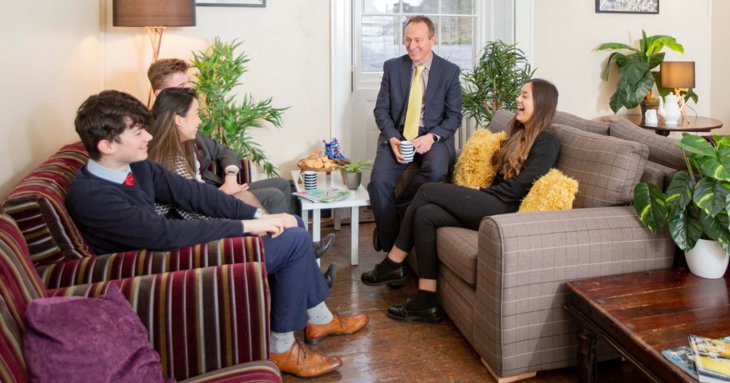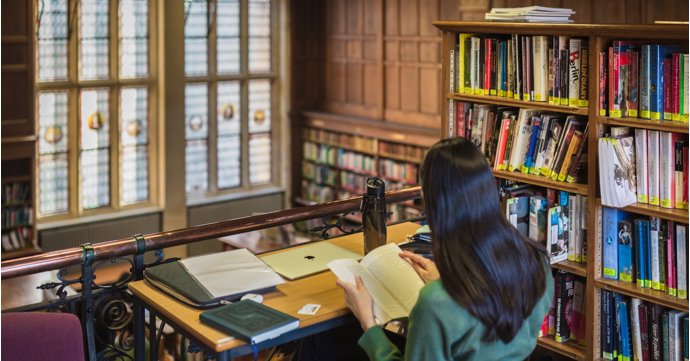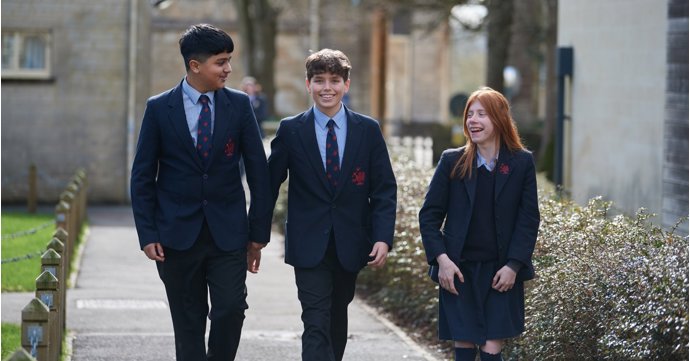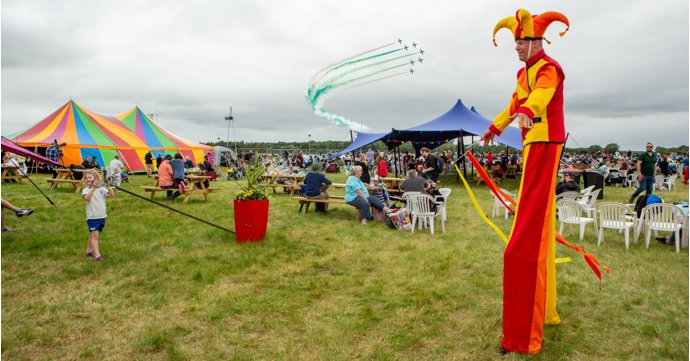Being thoughtful, adventurous and ambitious are fantastic traits to cultivate - and they're exactly what Rendcomb College near Cirencester encourages its pupils to be.
SoGlos spoke to Sixth Form student, Emilia, to discover what these qualities mean to her and how the college encourages pupils to embody them.
About the student - Emilia from Rendcomb College

Emilia joined Rendcomb College at Sixth Form to study A Levels in fine art, English literature and history; and is going on to study law at Oxford University.
Rendcomb College is a co-educational day and boarding school set within a picturesque Cotswold campus just outside Cirencester, welcoming pupils aged three to 18. Priding itself on its exceptional pastoral care, it also benefits from a countryside location, with outdoor education playing an important part in school life, alongside sport, music, drama and the arts.
What
does a typical day at Rendcomb College look like for you?
The days are long, which I admit took a while to get used to when I moved from my old school into the Rendcomb Sixth Form. However, this is offset by Rendcomb’s well-paced timetable. At Sixth Form, this includes periods outside of lessons.
Having these ‘free’ or ‘study’ periods I find to be really important, as they are conducive to maintaining a manageable workload and allow me to spend time working on what I find most interesting - or what I find most difficult.
At break time, the Sixth Form Centre - or ‘Old Rec’ - is busy with both Upper Sixth and Lower Sixth pupils, who mingle with one another or visit the confectionary shop nearby the college campus. On Thursdays, ‘Old Rec’ is less busy as pupils congregate in the Main College building to participate in or watch the Coffee Concert, where pupils prepare a piece of music to perform in front of an audience, with sweet food and hot beverages available.
Lunchtime is always a good hour! The catering team consistently makes delicious and varied dishes, with options of hot and cold food available. Furthermore, all allergens and dietary requirements are catered for, with any allergens in a dish being clearly displayed for diners to see. As someone with a vegan diet, I was delighted to see how accommodating the catering team was, and how inclusive the menus were.
Which subjects do you enjoy studying most and why?
The A Levels I take are fine art, English literature and history, plus an extended project qualification. All of my A Levels encourage independent thought and demand consistently critical analysis, which I have grown to enjoy and be better at. This combination of independent thought and critical analysis is key to studying art at A Level, as I am required both to analytically consider the work of other artists and then to generate ideas to create my own projects.
The amount of writing that I do for each subject has also greatly improved my clarity and conciseness, making me feel more confident in my ability to express ideas and form viewpoints. This has been particularly so with my history A Level; I have found it so useful and important to learn how to evaluate sources of research according to their value and convincingness by using relevant historical evidence. This is an invaluable skill that I have really enjoyed cultivating.
Undoubtedly, I would not love each of my subjects as much as I do had it not been for the presence of my teachers, who are constantly supportive and open to discuss anything I find especially difficult or interesting. In English literature, for example, my teacher indulges and encourages my interest in post-colonial criticism and interpretations of Shakespeare, readily discussing the topic with me and directing me towards texts that I may use to develop my knowledge further.

Rendcomb encourages students to be thoughtful, adventurous and ambitious – what does that mean for you personally? How do you embody these traits?
To me, the qualities of ‘thoughtful, adventurous and ambitious’ symbolise the components of a holistic education —‘thoughtful,’ the curriculum and school community; ‘adventurous,’ extra- and super-curricular activities; and ‘ambitious,’ life beyond one’s current educational institution and stage.
To embody ‘thoughtfulness,’ I engage fully with my school’s curriculum, studying the content taught to me as necessary, but also considering its wider significance — i.e. being ‘thoughtful’ about it. To embody ‘thoughtfulness’ as it pertains to being caring, I engage with my school’s community, which Rendcomb facilitates through opportunities such as the School Council, the EDI Committee and the Prefect team. Embodying ‘thoughtfulness’ is thus a twofold process.
To embody ‘adventurousness,’ I engage with the extra-curricular activities available to me at school, which at Rendcomb includes various sports clubs, the learning of a musical instrument, or the Eco Club. Furthermore, I engage with the super-curricular activities available to me, whether they relate to a subject I am currently studying, or a subject that I want to study in higher education.
To embody ‘ambition,’ I set goals for my life after and beyond school, which for me relates to my ambition to study law at university. In setting these goals, working towards them is necessary to truly embody ‘ambition,’ which somewhat overlaps with the ‘adventurousness’. Nonetheless, such activities relating specifically to ‘ambition’ include researching my course and universities and engaging with the resources available through Rendcomb’s subscription to UniFrog.
How do your lessons encourage you to be thoughtful at school?
The small class sizes are probably the most obvious difference between Rendcomb and my old school - and the positive impact of this on the quality of my learning has been significant. Having fewer people in classes means I can spend more time with teachers and seek more personalised help from them. It also fosters a great degree of camaraderie and friendship between my classmates and I, allowing us to collaborate more closely.
Classes are often discussion-based and include resources and activities that encourage critical analysis and evaluation, allowing me to grasp both the conceptual ideas and key details of my A Levels.
How does Rendcomb College support you to be thoughtful outside of the classroom?
Rendcomb offers a variety of opportunities for thoughtfulness. Extending my academic thoughtfulness is available through membership of the Suffolk Group, which is open to pupils in Year 11 upwards. The group spends each term studying a different topic — last year we studied theories of knowledge and of education. The highlight of the Suffolk Group, however, is its production of a debate in the first term of each new year, the research and preparation for which is done entirely by students separated into two teams. The topics of debate during my participation in the group have been whether alcohol should be banned and whether a universal language should be implemented for global usage.
For more independent academic thoughtfulness, Rendcomb has also begun to run its own essay competition, for which multiple questions are generated by each department for the choice of any pupil wishing to participate. This year, questions include the role of sporting events in advocacy for moral issues and whether rich nations should compensate developing nations, in light of the COP27 summit.
Finally, the EDI Committee has allowed me to be more thoughtful and proactive in improving the equality, diversity and inclusivity of the college. It has allowed me to develop confidence in my own identities and has enabled me to become closer to and more understanding of the identities of others. As a corollary, it has also enabled me to become more learned in the problems that are faced by those with marginalised identities - and also how those problems may be eliminated.

Can you give us an example of how the school encourages you to be adventurous and step outside your comfort zone?
My comfort zone could probably be defined as: studying subjects that interest me and interacting with as few people as possible! Because of this, I have never been particularly comfortable working in teams or with others, but the college has helped me to improve this in how it organises a number of team building activities for the Sixth Form.
For example, Year 12s are encouraged to bond through a day in the school’s forest wilderness, undertaking various problem-solving activities in teams before drinking hot chocolate and eating marshmallows around the fire pit. Also in Year 12, a programme of 'community links’ takes place, in which teams of Year 12s either remain at college and work on a fundraising event for their chosen charity, or are sent to a local school or care home to interact with the schoolchildren or residents.
How does the school support you to be ambitious and strive for your goals?
The support of Rendcomb for achieving my goal of studying law at Oxford was phenomenal and I am so grateful for it. The process was made so smooth and less stressful because of the aid of my head of Sixth Form, Mrs Williams, who organised one-to-one discussion sessions about law with me in Year 12 and guided me in where to find extra reading about law.
In Year 13, I was well prepared for the interview process; the college arranged two practice interviews for me prior to their actually taking place and the provisions for the interviews, which took place virtually and at the college, were all well-made in order to ensure that the process went smoothly for me. I consider the college’s support to have been vital for my receiving an offer from Oxford.




















